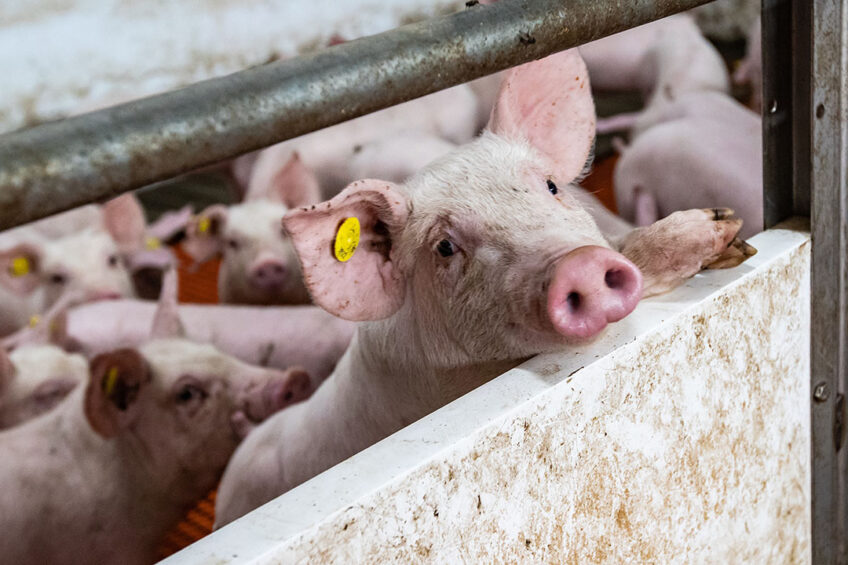6 anti-stress additives in pig diets

In intensive production systems, pigs are exposed to a variety of stressors. Nutritional interventions with additives can limit health problems and growth losses due to stress. This article describes 6 potential anti-stress additives for pigs.
Functional amino acids, plant extracts, organic acids, prebiotics, probiotics, minerals, and vitamins have the potential to improve stress resistance, to enhance the amount of antioxidant enzymes in key signalling pathways, and to mitigate damage caused by stress responses in pig production.
 Functional amino acids
Functional amino acids
Amino acids are categorised as essential amino acids and non-essential amino acids, based on the net protein synthesis. Some amino acids play functional roles in improving survival, growth, development, immunity, lactation and reproduction.
Common functional amino acids include arginine, glutamate, leucine, tryptophan, glutamine, proline, cysteine, methionine, threonine, aspartic acid, asparagine, and glycine.
Arginine is essential for all phases of pig development including weaning, finishing, gestating and lactation. Arginine supplementation improves foetal growth in late pregnancy, the survival of newborn piglets, and fertility and semen antioxidant capacity. In addition, arginine alleviates the losses of average daily gain and feed efficiency in heat-stressed weaning piglets.
In growing pigs, dietary supplementation with arginine and lysine prevents the level of plasma cortisol during transportation stress and attenuates oxidative damage. In post-weaning piglets, glutamate supplementation increases daily weight gain and feed efficiency and improves gut barrier homeostasis, growth performance and survival rates of weaning piglets.
Dietary supplementation with leucine decreases the cortisol level in serum and ameliorates diarrhoea in weaned piglets. In growing pigs exposed to heat stress, dietary supplementation with leucine increases average daily gain and reduces backfat thickness.
 Plant extracts
Plant extracts
Plant extracts are complex mixtures purified from natural compounds containing essential oils, polyphenols, flavonoids, polysaccharides, and lectin. Plant extracts have antioxidant, antiviral, antifungal and anti-parasitic properties to alleviate the stress response in pigs.
Thymol, carvacrol, and eugenol downregulate the gene expression of bacterial virulence factors, quorum sensing, and biofilm formation, thus controlling E. coli infection. Paeoniflorin reduces the virulence of Streptococcus suis and E. coli. In gestating gilts, supplementing silymarin elevates prolactin concentration, thus protecting sows against oxidative stress. Dietary curcumin supplementation increases antioxidant capacity in piglets.
In weaning piglets, dietary supplementation with Eucommia ulmoides leaf extract improves growth performance and jejunal morphology with a concurrent reduction in diarrhoea rate. Paper mulberry leaf extract alleviates diarrhoea, improves antioxidant capacity and immune function.
Before transportation, Supplementation of quercetin and oregano essential oil in finishing pig diets before transportation decreases transportation stress and the risk of gut injury.
Betaine supplementation in the diet of grower pigs prevents high rectal temperatures and the increase in colon permeability caused by heat stress.
 Organic acids
Organic acids
Organic acids such as acetate, propionate, and butyrate improve gut integrity, antioxidant capacity, and feed conversion rate in piglets. In addition, organic acids decrease pathogen colonisation and enhance appetite in pigs, thus promoting growth performance.
Butyrate in newborn piglets increases post-weaning body weight by 13%. A mixture of formic acid and propionic acid in weaning piglets is used as an alternative to antibiotics, reducing inflammatory response and the incidence of diarrhoea.
Capric acid and lauric acid have antibacterial properties which induce bacterial cell lysis in the gut tract. In piglets, lactic acid suppresses Salmonella by lowering gastric pH and stimulating pancreatic exocrine response and ameliorates diarrhoea.
In weaned piglets, dietary supplementation with chlorogenic acid increases the population of beneficial bacteria such as Lactobacillus and decreases the population of E. coli in the colon. Benzoic acid improves the growth performance of growing pigs.
 Prebiotics
Prebiotics
Fructo-oligosaccharides improve gut barrier function and immunological function during immune stress induced by E. coli, thus reducing the incidence of diarrhoea in weanling piglets. In addition, fructo-oligosaccharides alleviate constipation and enhance the antioxidant defence capacity of sows.
Chito-oligosaccharides promote growth performance by enhancing immunity status and modulating gut microbiota and gut morphology in weaned piglets. Supplementing chito-oligosaccharides in the pregnant sow’s diet improves coping mechanisms with oxidative stress in the placenta during late gestation. In addition, chito-oligosaccharides supplementation enhances the abundance of Lactobacillus in faeces and the villus height to decrease the incidence of diarrhoea due to weaning stress.
 Probiotics
Probiotics
Probiotics including Lactobacilli, Bacillus, Bifidobacterium, and Saccharomyces boulardii promote enzyme activity, secrete secondary metabolites and activate antioxidant signalling pathways.
Lactobacillus acidophilus inhibits the virulence of E. coli in weaning piglets. Lactobacillus fermentum is tolerant to exogenous and endogenous oxidative stresses. Metabolites from probiotics such as folate regulate the antioxidant capacity and increase the organ weight and stomach pH in piglets.
 Minerals and vitamins
Minerals and vitamins
Minerals including manganese increase average daily gain and feed efficiency in pigs. Dietary chromium propionate improves the immune function and average daily feed intake in heat-stressed finishing pigs.
Supplementation of selenium in gilt diets mitigates rectal temperature and alleviates heat stress in the short term.
Zinc improves growth performance in weaning piglets, and copper, iron, zinc, and manganese improve immune function and antioxidant status in growing-finishing pigs.
Supplementation of vitamin E and selenium together relieves gut barrier damage in heat-stressed growing pigs. Dietary supplementation with vitamin C alleviates liver damage caused by zearalenone. Supplementation of vitamin A in gilts infected with the porcine epidemic diarrhoea virus enhances the IgA level and lactogenic immune protection of nursing piglets.
Concluding remarks
Supplementing relevant nutrients including functional amino acids, plant extracts, organic acids, prebiotics, probiotics, minerals, and vitamins improves stress resistance, enhances the amount of antioxidant enzymes in key signalling pathways, and mitigates damage caused by stress responses in pig production.
In addition, screening new biomolecules and designing targeted formulas against stress is a sustainable cost-effective alternative to relieve stress in pig production systems. However, further research is required to find more effective novel anti-stress methods.
This article is based on the publication: Wang L, Wang C, Peng Y, Zhang Y, Liu Y, Liu Y, Yin Y. Research progress on anti-stress nutrition strategies in swine. Anim Nutr. 2023 Apr 6;13:342-360.











